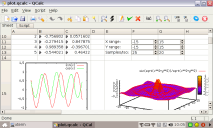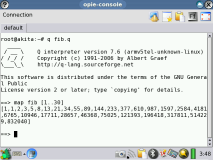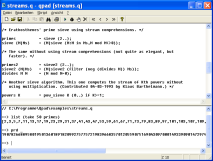CONTENTS
NewsAbout
Examples
Documentation
Lists
Core
Add-Ons
Download
Links
![[SourceForge]](sflogo2.gif)
Download
Quick Map: [Ports and Packages] [Binaries] [Sources] [Dependencies]
The central resource for all Q development is the
SourceForge project
website, which provides
CVS access to the
latest development sources. You can also find all released packages in the
download
area at this site. For your convenience, we provide a quick map of the
sources for the current versions below, as well as pointers to ready-to-use
ports and binary packages. Q is known to work on Linux, OS X and Windows, but
should also compile (with the usual amount of tweaking) on most other modern
UNIX systems and POSIX-compatible platforms. Linux is the primary development
platform, so all packages should compile right out of the box on all recent
Linux systems (do the usual "./configure; make; make install",
or just "make" for some packages).
License: Unless explicitly noted otherwise, the software on this page is distributed under the GNU General Public License.
Ports and Packages
Thanks to the (much appreciated!) work of Toni Graffy, Gerard Milmeister and Ryan Schmidt, ready-to-use Q packages for Linux (SUSE, Fedora) and Mac OS X are available from the Packman, Fedora and MacPorts projects, see below for details. Additional packages for MS Windows, the ASUS eee PC and the Sharp Zaurus PDA can be found in the Binaries section below.
 Fedora:
Gerard Milmeister's q package
from the Fedora Linux distribution
includes the interpreter core and some of the core modules. If you're
interested in computer music applications, you should also take a look at
Stanford's PlanetCCRMA project
maintained by Fernando Lopez-Lezcano, which provides additional software like
MidiShare, Pd and SuperCollider required by Q's multimedia library. (The Q
multimedia modules themselves have not been packaged for Fedora yet,
so you will have to compile these yourself.)
Fedora:
Gerard Milmeister's q package
from the Fedora Linux distribution
includes the interpreter core and some of the core modules. If you're
interested in computer music applications, you should also take a look at
Stanford's PlanetCCRMA project
maintained by Fernando Lopez-Lezcano, which provides additional software like
MidiShare, Pd and SuperCollider required by Q's multimedia library. (The Q
multimedia modules themselves have not been packaged for Fedora yet,
so you will have to compile these yourself.)
 Mac OS X:
Ryan Schmidt's port
of Q to OS X is available from the MacPorts project. This currently comprises
the core package only, but additional modules might become available in the
future. Note that MacPorts already provides the necessary third party
libraries to compile and run most addon modules, so porting these to OS X
should be a piece of cake now.
Mac OS X:
Ryan Schmidt's port
of Q to OS X is available from the MacPorts project. This currently comprises
the core package only, but additional modules might become available in the
future. Note that MacPorts already provides the necessary third party
libraries to compile and run most addon modules, so porting these to OS X
should be a piece of cake now.
 openSUSE:
Toni Graffy's Q packages provide a complete Q system
including all core and addon modules for recent
openSUSE versions. These are supplied as
two sets of packages, see
q-core and
q-addons on
the Packman site.
Note that Packman is a full YaST repository, so all required packages can
easily be installed from YaST once you added Packman using YaST's
"Community Repositories" applet.
openSUSE:
Toni Graffy's Q packages provide a complete Q system
including all core and addon modules for recent
openSUSE versions. These are supplied as
two sets of packages, see
q-core and
q-addons on
the Packman site.
Note that Packman is a full YaST repository, so all required packages can
easily be installed from YaST once you added Packman using YaST's
"Community Repositories" applet.
Binary Packages
 Debian/ASUS
eeePC: While Q compiles out of the box on recent
Debian systems, there don't seem to be any Debian packages for Q yet, so I've
put together a little collection of packages which let eeePC users enjoy Q
on this nifty little Linux machine. Reportedly these also work on
other i386 Debian systems, but YMMV. You can find the packages here:
Debian/ASUS
eeePC: While Q compiles out of the box on recent
Debian systems, there don't seem to be any Debian packages for Q yet, so I've
put together a little collection of packages which let eeePC users enjoy Q
on this nifty little Linux machine. Reportedly these also work on
other i386 Debian systems, but YMMV. You can find the packages here:
 Zaurus:
For Zaurus users who want to run Q on their Linux PDA, we have a little
software feed with binary packages for the latest
OpenZaurus. You can find
the current feed here:
Zaurus:
For Zaurus users who want to run Q on their Linux PDA, we have a little
software feed with binary packages for the latest
OpenZaurus. You can find
the current feed here:
MS Windows: The Qpad package is a complete binary distribution of the Q programming system for Windows 98/2000/ME/XP. Besides the Q programming tools, the standard library and most of the modules it also includes the Qpad application, a simple Windows IDE for the Q interpreter which allows you to edit and run your Q scripts. You can grab the package here:
 This package is in MSI
format which can be installed simply with a
double-click. To make this work on older Windows versions, you may have to
install Windows Installer 2.0, which is available
here
(Windows NT/2000) and
here
(Windows 9x/ME). (For Windows XP and Vista no additional software should be
required.) Please note that at this time the ncurses, Qt/Q and
Pd/Q modules have not been ported to Windows yet and thus are not included in
the Windows package. Also, I didn't have the opportunity to test the package on
Vista yet, any feedback on that is appreciated.
This package is in MSI
format which can be installed simply with a
double-click. To make this work on older Windows versions, you may have to
install Windows Installer 2.0, which is available
here
(Windows NT/2000) and
here
(Windows 9x/ME). (For Windows XP and Vista no additional software should be
required.) Please note that at this time the ncurses, Qt/Q and
Pd/Q modules have not been ported to Windows yet and thus are not included in
the Windows package. Also, I didn't have the opportunity to test the package on
Vista yet, any feedback on that is appreciated.
Requirements: The Qpad application requires Microsoft's MFC
libraries; if these aren't available on your system then you should install the
VC6RedistSetup package which can be obtained
here.
Most other required libraries are included, except ImageMagick, Tcl/Tk and
Gnocl, which are needed for the magick and tk modules
and GQBuilder, respectively. These are available under the following URLs:
ImageMagick
(you need version 6.2.9-x-Q16-windows-dll);
Tcl/Tk
(you need version 8.4); Gnocl (you need the
0.9.91-win32 build which is available here; please see the README file included in this package for
instructions on how to install Gnocl on Windows).
In addition, the opengl module needs the OpenGL library, but this
will usually be supplied with the drivers of your graphics card. For the
openal module you'll also need OpenAL 1.1, available
here.
Source Packages
Here you can find the source tarballs that you need if you want to compile Q yourself. (Please note that the source tarballs for the multimedia examples are not listed here, but can be found on the Examples page.) The source packages are divided into the core package (containing the interpreter and the core modules) and separate tarballs for the different add-on modules. When compiling from the sources, you'll always need the Q core package, the other source packages are optional.
 Q
7.11
Q
7.11 |
[Release Notes] |
|---|---|
| Description: | |
| Source: | |
| Requires: | pthread and GNU
iconv libraries (or compatible replacements). Other
third-party libraries are required to make the various modules included in
the core package work, see Core for details. Most
required libraries should be readily available on recent Linux and *BSD
systems.
|
 GQBuilder
1.1
GQBuilder
1.1 |
[Release Notes] |
| Description: | |
| Source: | |
| Requires: | |
 Graph
1.8
Graph
1.8 |
[Release Notes] |
| Description: | |
| Source: | |
| Requires: | |
 Mod_q
1.1
Mod_q
1.1 |
[Release Notes] |
| Description: | |
| Source: | |
 Pd/Q
0.4
Pd/Q
0.4 |
[Release Notes] |
| Description: | |
| Source: | |
| Requires: | |
 QCalc
1.2
QCalc
1.2 |
[Release Notes] |
| Description: | |
| Source: | |
| Requires: | |
 Q+Q
0.9.6
Q+Q
0.9.6 |
[Release Notes] |
| Description: | |
| Source: | |
 Q[i][X]
0.6.1
Q[i][X]
0.6.1 |
[Release Notes] |
| Description: | |
| Source: | |
 QCWrap
1.2
QCWrap
1.2 |
[Release Notes] |
| Description: | |
| Source: | |
 Q Yacc/Lex
1.1
Q Yacc/Lex
1.1 |
[Release Notes] |
| Description: | |
| Source: | |
 Q-Audio
2.7
Q-Audio
2.7 |
[Release Notes] |
| Description: | |
| Source: | |
| Requires: | |
 Q-CSV
0.2
Q-CSV
0.2 |
[Release Notes] |
| Description: | |
| Source: | |
 Q-Faust
1.8
Q-Faust
1.8 |
[Release Notes] |
| Description: | |
| Source: | |
| Requires: | |
 Q-Midi
2.1
Q-Midi
2.1 |
[Release Notes] |
| Description: | |
| Source: | |
| Requires: | |
 Q-NCurses
1.1
Q-NCurses
1.1 |
[Release Notes] |
| Description: | |
| Source: | |
| Requires: | |
 Q-OpenAL
1.4
Q-OpenAL
1.4 |
[Release Notes] |
| Description: | |
| Source: | |
| Requires: | |
 Q-OpenGL
1.3
Q-OpenGL
1.3 |
[Release Notes] |
| Description: | |
| Source: | |
| Requires: | |
 Q-SQLite3
1.2
Q-SQLite3
1.2 |
[Release Notes] |
| Description: | |
| Source: | |
| Requires: | |
 Q-Synth
1.7
Q-Synth
1.7 |
[Release Notes] |
| Description: | |
| Source: | |
| Requires: | |
 Q-Xine
1.5
Q-Xine
1.5 |
[Release Notes] |
| Description: | |
| Source: | |
| Requires: | |
 Qt/Q
1.4
Qt/Q
1.4 |
[Release Notes] |
| Description: | .ui files). Support
for the Qt assistant html help system is also included.
|
| Source: | |
| Requires: | |
 SWIG
1.3.22-q-20071021
SWIG
1.3.22-q-20071021 |
[Release Notes] |
| Description: | ./configure; make; make
install. (Windows users don't need this package, since a suitable
SWIG version is already included in the binary Qpad package.)
|
| Source: |
Dependencies
Virtually all 3rd party software required by Q and its modules is readily available on Linux systems nowadays. However, you'll need the following updated gnuplot package (built from CVS sources) if you want to run gnuplot inside the QCalc application.
 Gnuplot
4.3
Gnuplot
4.3 |
[Release Notes] |
|---|---|
| Description: | |
| SUSE 10.3 RPM: | |
| Source RPM: |